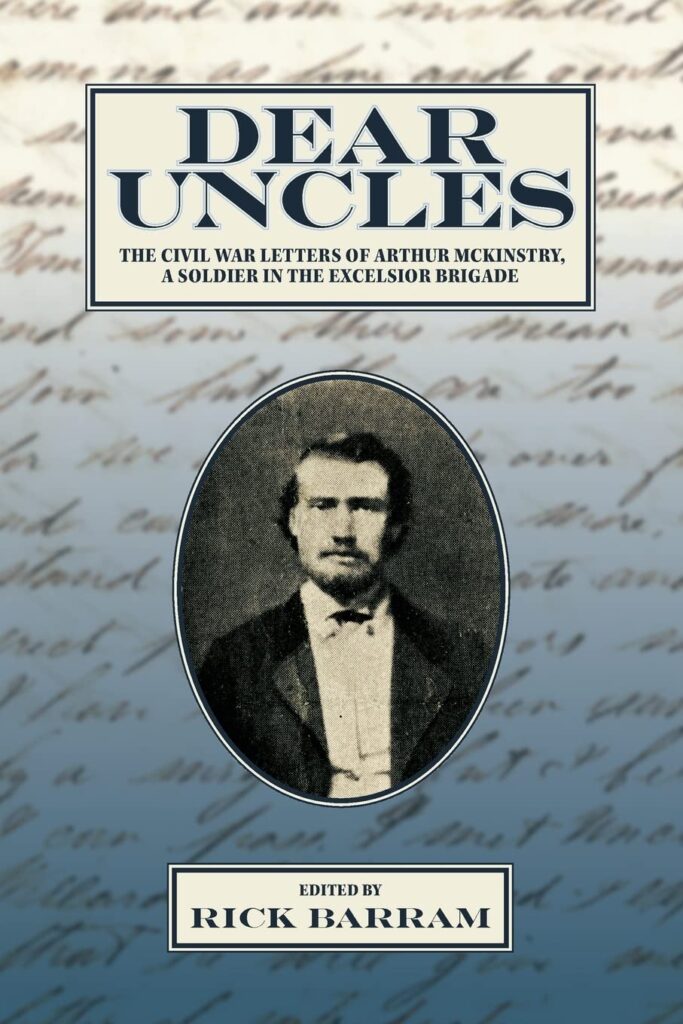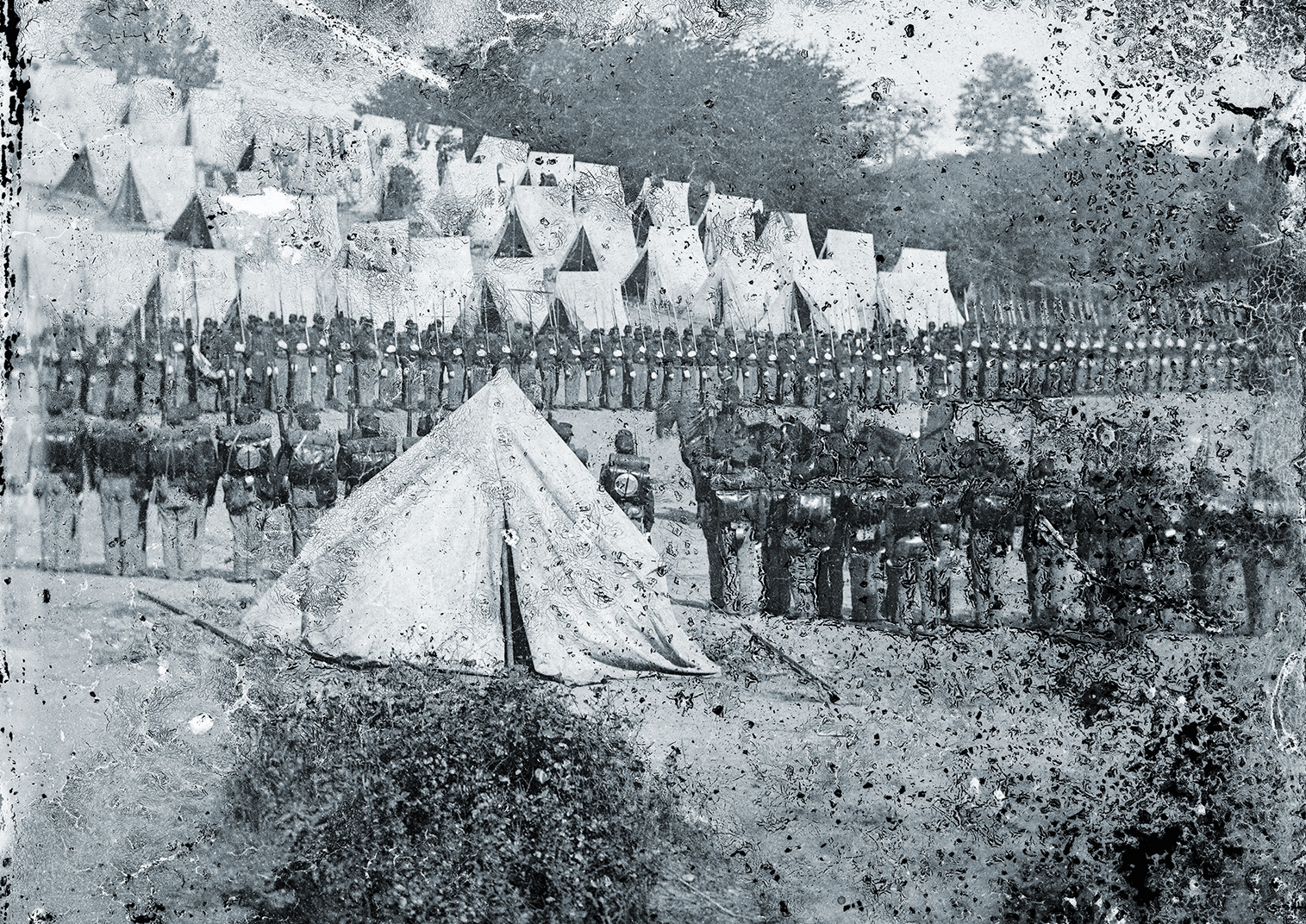When 21-year-old Arthur McKinstry left Chautauqua County, New York, in early June 1861 to affix the Excelsior Brigade raised by then-Colonel Daniel Sickles, he was increased prepared for writing than combating. When Arthur reached the unit's teaching camp on Staten Island, he wrote to his mother, informing him that his Uncle Willard had given him “a transportable inkwell and all types of stationery and writing provides” to take with him “so that… I would maintain it.” “He educated us of our actions.
Nonetheless, his uncle had an ulterior motive. Willard and Arthur's Uncle Winthrop owned and operated it Fredonia Censora neighborhood weekly newspaper. They consider to publish Arthur's letters. What increased answer to teach and attraction to new readers?
Rick Barram, a retired historic previous teacher, brings Arthurs with him Censor Letters – saved on the Darwin R. Barker Historic Museum in Fredonia, NY – “Into the Mild” and as well as includes a second assortment of letters – from Mississippi State School – that Arthur wrote to his mother and totally different relations. Dear uncles presents these letters “of their entirety…” notes Barram, “in an effort to understand the entire scope of Arthur’s experiences.”
Arthur's letters turned an integral part of the Censor's warfare reporting, appears in a column with the headline Dear uncles.
Virtually six dozen totally different “Letters, Opinions, and Letters Not Written by Arthur” moreover appear in Dear uncles. They appear as sidebars all by means of the e-book. Barram titles these dietary dietary supplements “Completely different Voices” and is supposed to “current context and in another case illuminate Arthur’s writings and experiences.”
Arthur was terribly successfully prepared for his place as a correspondent. “Successfully-read and well-read,” he entered the U.S. Naval Academy inside the fall of 1854 on the age of 15. Nonetheless, he quickly wasted his time there. Arthur racked up misbehavior errors and ranked on the bottom of his class academically, so he was judged “unfit” and dismissed.
Possibly to make up for his failure at Annapolis, Arthur responded early to the choice to arms when the Civil Wrestle broke out. The regiment was mustered into the third Regiment of the Excelsior Brigade, later designated the 72nd New York Infantry, and patrolled the Lower Potomac River inside the fall of 1861.
Arthur's letters mirror the youth's experiences inside the first part of his navy service. He usually recounts the relentless rigors of drilling and picketing. He usually suggestions on the local weather and far more usually on the meals. “[T]“The everyday of our males doesn’t get enough to meet their hunger…” he writes jokingly. “On all the, we're not doing pretty along with the convicts in state jail…”
Arthur usually peppers his texts collectively along with his opinions about campmates and officers. “Our regiment is a particular one,” he claims, “nevertheless to the exact of the camp are the 'roughs' from the city.” They seem to be a rogue group and we constantly guard them to efficiently forestall thefts.”
Even Dan Sickles, now a Brigadier, can’t escape a blended analysis. He “confirmed good vitality and patriotism in elevating and equipping the brigade,” Arthur writes. “Nonetheless, he dominated it in a civilian technique…clearly incapable of personally maneuvering the brigade.”
Arthur cherished his place as a journalist. “I really feel it's a extremely good issue to be a correspondent Censor for I noticed that the officers there hottest to have an excellent phrase fairly than a foul one,” he wrote. “All in all, I’m doing along with a private citizen can get.”
Typically his writing benefited his comrades. At her urging to “state the data,” Arthur uncovered a sutler who was “using a system of extortion on the troopers of the brigade.”
A little bit of over a month later, Arthur was ready to report: “We now have now a model new sutler proper right here and he is further smart than the outdated one.”
Arthur was a keen observer. Little escaped his uncover. He might have been prescient when he wrote in December 1861, “I actually contemplate that this warfare, as a result of it now stands, will ultimately be the demise blow to slavery.”
He moreover wrote with foresight to the Censor On Would possibly 4, 1862, he began his letter with the phrases, “My time is very transient…” Hours later, Arthur's pen was put to rest ceaselessly when he was killed “by a shot through the leg and groin” on the Battle of Williamsburg.
Arthur was pleased when an official often known as him a “typist.” Nonetheless even Arthur warned his readers: “It will likely be tedious to tell of the entire modifications we troopers are making…” That is often a cautionary story for readers Dear uncles.
There could also be rather a lot proper right here that readers will have the benefit of; usually presumably an extreme quantity of. As an illustration, by alternating between verbatim letters Arthur wrote to his uncles and letters he wrote to his mother and others, often at or near the similar time, his suggestions are typically repeated and duplicated.
To this mix, Barram embeds two courses of notes all by means of the textual content material. These are supposed to stipulate or make clear “worldwide phrases” and totally different references that Arthur likes to utilize. Such notes appear again and again and gives the narrative flow into a uneven bear in mind.
Inside the final chapter and a succinct epilogue, Barram offers a brief historic previous of the Excelsior Brigade with fascinating particulars about “the future of Arthur's comrades.” Fairly a number of images, maps and illustrations complement the textual content material.
Dear uncles offers a wealth of information, notably to school college students inside the Excelsior Brigade. The e-book moreover offers a novel notion into the usually uncared for actions alongside the Lower Potomac River early inside the warfare.
“[R]readers of the Fredonia Censor“Attributable to Arthur McKinstry and his uncles,” writes Barram, “they’ve been ready to adjust to the adventures of their Chautauqua County boys.” Readers of Dear uncles are literally ready to adjust to Arthur McKinstry's tales as a result of efforts of Rick Barram.

Dear uncles
The Civil Wrestle letters of Arthur McKinstry, a soldier inside the Excelsior Brigade
Edited by Rick Barram, Excelsior, 2023
If you happen to purchase one factor through our web page, we might acquire a payment.
